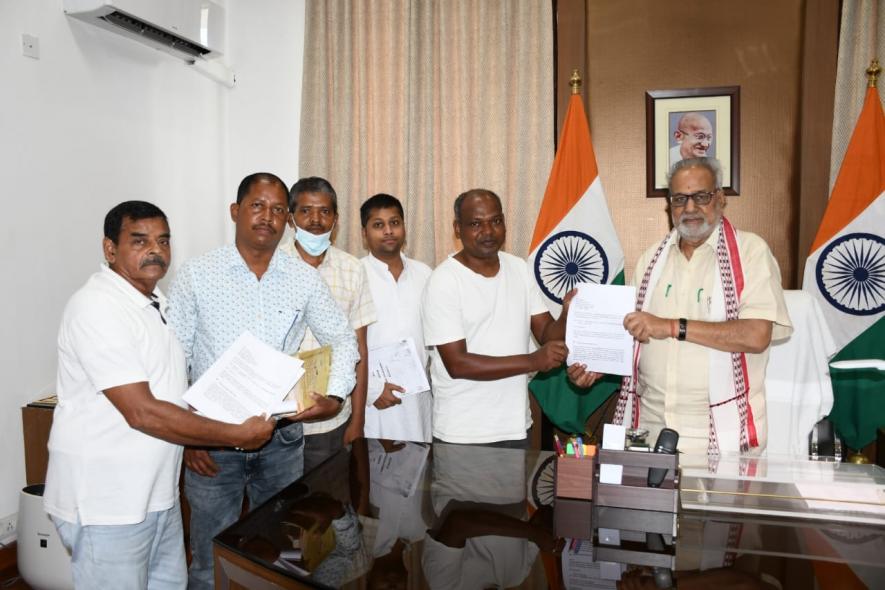Odisha Governor Meets With Sundargarh Displaced Adivasis, Assures Support

Odisha Governor Ganeshi Lal with the delegation from Sundargarh
Bhubaneswar: The Governor of Odisha, Ganeshi Lal, on Monday met with a delegation of Adivasis facing displacement for the second time in Odisha's Sundargarh district. After the meeting, Lal assured the delegation that he would write to Odisha Chief Minister Naveen Patnaik, raising their issues.
The delegation that included Bondamunda Anchalik Surakshya Samiti's Deme Oram and Rourkela Displaced Persons' Committee's Ram Chandra Sahu, placed before Lal issues of Adivasis who are affected by projects by three government agencies – the Rourkela Steel Plant (RSP) of the Steel Authority of India, the Mandira Dam, and the South Eastern Railways.
After meeting with Lal, Oram said that the Governor had assured the delegation that he would urgently write to the Chief Minister. If need be, Lal assured them, he would write to the President of India on the matter. "The governor understood that since we have been displaced for several generations, it is a serious matter," Oram said.
“The Governor assured us that he will recommend that until our issue is sorted out, there should be no more new projects in our area. He also said that he would recommend that there be no penal action taken or criminal cases booked against the affected persons until we are resettled," Oram added.
“We are very satisfied with the meeting and the governor's statements,” Oram said. "He will now write to the Chief Minister and let us see what reply comes from the Chief Minister's Office," Oram concluded.
Under the Indian Constitution, the Governor is the custodian of tribes and tribal land. As a district that comes under the 5th Schedule of the constitution, the Governor has the authority to decide if any central or state legislation has implications for the Sundargarh district and can also repeal or amend any regulations as far as they affect the district.
In recent years, Oram said, the district has seen three projects by the South-Eastern Railways that are leading to further displacement of Adivasis who were already displaced in earlier decades by the RSP and the Mandira Dam. These include a freight corridor along the Howrah-Mumbai line and a new freight line from Dhamra port to Godda in Jharkhand (that will carry coal imported from Australia to an under-construction 1600 MW thermal power plant in Godda) that passes through the district, and siding track alongside existing lines.
Despite recommendations by the National Commission for Scheduled Tribes that further bar construction on the disputed land, the Railways has been conducting construction work that the Adivasi residents hold is illegal. This has led to protests by the Adivasi community, and on March 28, Oram, along with 21 others, was arrested at such a protest. He was released on bail on April 20, and the other arrested persons have also since received bail.
In a representation submitted to the Governor, the delegation also detailed the legal history of the disputed land.
In a special report submitted by the National Commission on Scheduled Tribes (NCST) in 2016, the Commission had recommended that the Odisha state government should consider returning 5,000 acres of land that was originally acquired for the RSP in the 1950s-60s – but was never utilised – to the original owners/tenants/their heirs. Any further construction made by the RSP or the state government through the district administration should be started after taking the stakeholders' consent and that of the Commission, the report further recommended.
The report called for the Governor to declare the land acquisition process of the RSP as null and void with retrospective effect. The report noted that the RSP management had agreed in an agreement executed on January 11, 2006, at Bondamunda in Sundargarh district that unused/unutilised surplus and surrendered land should be offered to its original tenant/legal heirs.
Then, the representation said, in an order dated November 26 2008, the Government of Odisha had provided for 5 acres of unirrigated and 2 acres of irrigated land to be provided to each displaced family.
Subsequent orders of the NCST in 2018 and 2019, the representation said, had called for no eviction of Adivasi families settled on the acquired land until they were provided adequate resettlement and rehabilitation under law. They had instituted a bar on any form of construction on the acquired land by the administration and railway department without the consent of the displaced tribes.
They also instituted a bar on the deployment of the police force unless deemed necessary. They had further enshrined that displaced tribal families' candidates should be given priority for employment in the railways.
A meeting conducted on February 14, 2020, under the chairmanship of the Additional District Magistrate of Sundargarh and in the presence of the Rourkela Superintendent of Police and authorities of the South-Eastern Railways had given an assurance that the government would consider the issue of allotment of land as rehabilitation and for resettlement and that another meeting would be convened following the decision of the Railways on employment, but no concrete steps have been taken on this meeting till now, the representation noted.
The author is an independent journalist.
Get the latest reports & analysis with people's perspective on Protests, movements & deep analytical videos, discussions of the current affairs in your Telegram app. Subscribe to NewsClick's Telegram channel & get Real-Time updates on stories, as they get published on our website.























